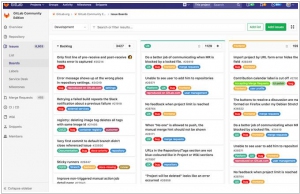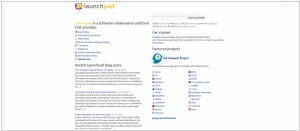Gitlab vs Launchpad
May 28, 2023 | Author: Michael Stromann
14

GitLab offers git repository management, code reviews, issue tracking, activity feeds and wiki’s. Enterprises install GitLab on-premise and connect it with LDAP and Active Directory servers for secure authentication and authorization. A single GitLab server can handle more than 25,000 users but it is also possible to create a high availability setup with a multiple active servers.
See also:
Top 10 Issue and Bug Trackers
Top 10 Issue and Bug Trackers
GitLab and Launchpad are both web-based platforms for hosting and managing software projects, but they differ in terms of their focus, features, and user base.
GitLab is primarily known as a comprehensive DevOps platform that provides a full suite of tools for version control, continuous integration and deployment, project management, and collaboration. It is built around the Git version control system and offers features like code repositories, issue tracking, merge requests, pipelines, and built-in CI/CD capabilities. GitLab is widely used by software development teams and provides a robust and scalable solution for managing the entire software development lifecycle.
Launchpad, on the other hand, is a software collaboration platform developed and maintained by Canonical, the company behind Ubuntu Linux. While it also supports version control with Git or Bazaar, Launchpad's main focus is on providing infrastructure for hosting and distributing open-source software projects. It offers features like code hosting, bug tracking, translation support, and a personal package archive for building and distributing software packages.
See also: Top 10 Issue Trackers
GitLab is primarily known as a comprehensive DevOps platform that provides a full suite of tools for version control, continuous integration and deployment, project management, and collaboration. It is built around the Git version control system and offers features like code repositories, issue tracking, merge requests, pipelines, and built-in CI/CD capabilities. GitLab is widely used by software development teams and provides a robust and scalable solution for managing the entire software development lifecycle.
Launchpad, on the other hand, is a software collaboration platform developed and maintained by Canonical, the company behind Ubuntu Linux. While it also supports version control with Git or Bazaar, Launchpad's main focus is on providing infrastructure for hosting and distributing open-source software projects. It offers features like code hosting, bug tracking, translation support, and a personal package archive for building and distributing software packages.
See also: Top 10 Issue Trackers
Gitlab vs Launchpad in our news:
2015. Collaboration platform for developers GitLab raises $4M

GitLab, the open source Git-based collaboration platform for developers, has announced that it successfully secured $4 million in Series A funding. The company provides a free community edition, a free SaaS version, and a paid enterprise edition of its service. With the newly acquired funding, GitLab aims to expedite its growth and expand its global operations. Git has become the go-to method for code management among numerous development teams. While GitHub stands as the most well-known Git-hosting service, there exist several competitors in this realm, each offering their own unique approach and user interface on top of the fundamental hosted Git concept. Atlassian, for instance, provides both free and paid Git hosting services. What sets GitLab apart from some of these competitors is its strong emphasis on its open source solution.




